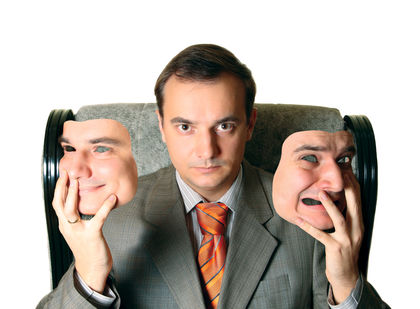The medical term schizophrenia is loosely used for several serious psychiatric conditions that are characterized by delusions and hallucinations in general. Those afflicted with it have difficulty in thinking logically, recognizing reality, and behaving appropriately in societal situations. Some experts think that schizophrenia develops as a result of environmental and genetic combination.
The identification of several genes that affect the manner in which a brain develops and how cells of the neurological system communicate have led to the recognition that schizophrenia is actually comprised of several mental illnesses.
Positive and Negative Schizophrenia
 It can start from early childhood and last throughout a person’s lifetime. Schizophrenics have disorganized speech and, as mentioned, are delusional and suffer from hallucinations. If a person has psychosis, however, it is not an indication that he/she has schizophrenia. Symptoms in schizophrenia are categorized as either positive or negative.
It can start from early childhood and last throughout a person’s lifetime. Schizophrenics have disorganized speech and, as mentioned, are delusional and suffer from hallucinations. If a person has psychosis, however, it is not an indication that he/she has schizophrenia. Symptoms in schizophrenia are categorized as either positive or negative.
The former’s symptoms are psychotic (delusions, disorganized behavior, hallucinations, disorganized speech) while the latter’s symptoms include inability to begin or continue productive activities and diminished or restricted expression of emotions. A majority of those suffering from schizophrenia also have problems with their cognitive, or intellectual, function and have issues regarding storing information for later use such as “just heard” phone numbers.
Symptoms to Watch Out For
Schizophrenia is an illness that is more common than people think. Can you tell if you might be afflicted with schizophrenia? Here are the symptoms to watch out for:
1. Positive
- Hallucinations or disordered perceptions: these may involve any or all of the five senses such as hearing, smell, sight, taste, and touch.
- Delusions or distorted thoughts.
- Disorganized behavior.
- Disorganized speech.
- Unusual or irregular motor activity.
2. Negative
- The so-called flat affect or an emotional range that is restricted.
- Unresponsive or limited speech that includes little or no expression.
- Difficulty in beginning or continuing any activity with goals as a result.
- Apathy results in the reduced ability of the individual to express his/her emotions.
Eliminating Other Symptoms
Intellectual or cognitive symptoms are harder for doctors to detect because these include issue about retention and use of information for organizing and planning. Diagnosis is often hard to make in cases of schizophrenia and may take months or years to conclude whether the patient’s illness pattern answers to the description of schizophrenic disorder.
While the brain’s function is obviously impaired in schizophrenic cases, tests — such as an MRI or magnetic resonance imaging, electroencephalogram or EEG, and computed tomography or CT — administered to patients have to yet to be conclusive to result in an exact diagnosis. These tests will help rule out tumors or seizures as symptoms so those of schizophrenia may be narrowed down.
Treating Schizophrenia
Antipsychotic medications such as Ambilify have been proven to be effective in the treatment of schizophrenia. Used in two phases, Ambilify changes the brain’s chemical actions and may be used in the two phases which characterize a schizophrenic episode: the acute phase in which higher dosage may be necessary to alleviate psychotic symptoms, and the maintenance phase in which dosage is reduced gradually for prevention of further episodes. Ambilify is also used in combination with other pharmacological preparations to treat depressive or bipolar disorders, mood swings, aggression symptoms, irritability, and temper tantrums.
Share This